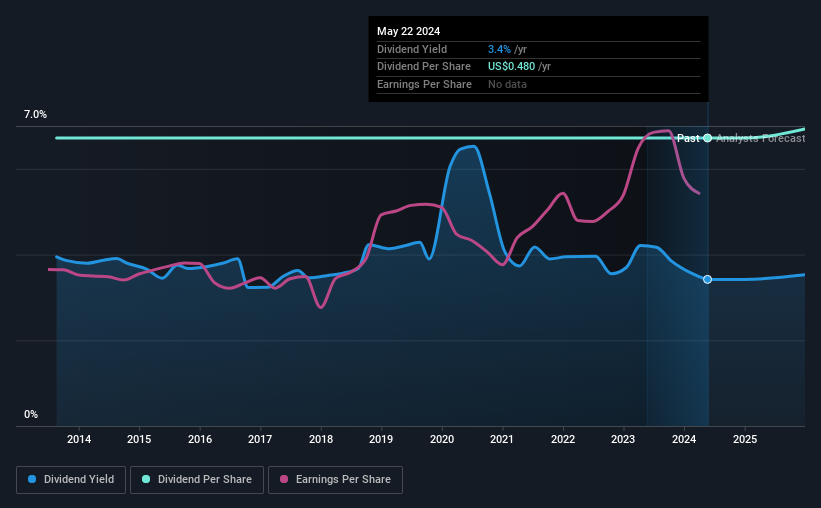F.N.B (NYSE:FNB) Has Announced A Dividend Of $0.12
F.N.B. Corporation's (NYSE:FNB) investors are due to receive a payment of $0.12 per share on 15th of June. This means that the annual payment will be 3.4% of the current stock price, which is in line with the average for the industry.
View our latest analysis for F.N.B
F.N.B's Payment Expected To Have Solid Earnings Coverage
We like to see a healthy dividend yield, but that is only helpful to us if the payment can continue.
Having distributed dividends for at least 10 years, F.N.B has a long history of paying out a part of its earnings to shareholders. Past distributions do not necessarily guarantee future ones, but F.N.B's payout ratio of 39% is a good sign as this means that earnings decently cover dividends.
The next year is set to see EPS grow by 12.2%. Assuming the dividend continues along recent trends, we think the future payout ratio could be 34% by next year, which is in a pretty sustainable range.
F.N.B Has A Solid Track Record
The company has been paying a dividend for a long time, and it has been quite stable which gives us confidence in the future dividend potential. The last annual payment of $0.48 was flat on the annual payment from10 years ago. While the consistency in the dividend payments is impressive, we think the relatively slow rate of growth is less attractive.
F.N.B May Find It Hard To Grow The Dividend
Some investors will be chomping at the bit to buy some of the company's stock based on its dividend history. F.N.B hasn't seen much change in its earnings per share over the last five years. If F.N.B is struggling to find viable investments, it always has the option to increase its payout ratio to pay more to shareholders.
We Really Like F.N.B's Dividend
Overall, we like to see the dividend staying consistent, and we think F.N.B might even raise payments in the future. Earnings are easily covering distributions, and the company is generating plenty of cash. All of these factors considered, we think this has solid potential as a dividend stock.
Companies possessing a stable dividend policy will likely enjoy greater investor interest than those suffering from a more inconsistent approach. However, there are other things to consider for investors when analysing stock performance. Companies that are growing earnings tend to be the best dividend stocks over the long term. See what the 9 analysts we track are forecasting for F.N.B for free with public analyst estimates for the company. If you are a dividend investor, you might also want to look at our curated list of high yield dividend stocks.
Have feedback on this article? Concerned about the content? Get in touch with us directly. Alternatively, email editorial-team (at) simplywallst.com.
This article by Simply Wall St is general in nature. We provide commentary based on historical data and analyst forecasts only using an unbiased methodology and our articles are not intended to be financial advice. It does not constitute a recommendation to buy or sell any stock, and does not take account of your objectives, or your financial situation. We aim to bring you long-term focused analysis driven by fundamental data. Note that our analysis may not factor in the latest price-sensitive company announcements or qualitative material. Simply Wall St has no position in any stocks mentioned.

 Yahoo Finance
Yahoo Finance 
